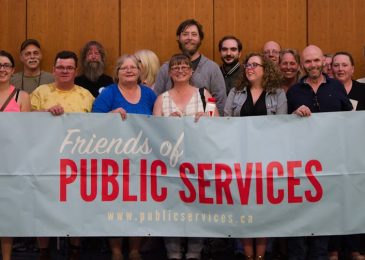This story was originally written for the excellent RankandFile.ca

KJIPUKTUK (Halifax) – “It used to be almost every postal worker would walk their route,” says Tony Rogers, president of the Canadian Union of Postal Workers (CUPW) Nova Local. “Postal workers would hop on a bus and make their deliveries. The lowest carbon footprint possible.”
Now all but seven out of 200 routes in metro Halifax are entirely motorized, and in this day and age that is just plain wrong, Rogers says.
Rogers spoke at a well-attended event in Halifax that set out to explore how to make Canada Post more socially responsible, greener and accountable to the citizens who own it.

The event is part of the Delivering Community Power roadshow spearheaded by the Friends of Public Services. The group wants to mobilize public opinion while a federal task force readies itself to hold a public review and make recommendations on the future of Canada Post.
There is a lot to consider. Canada Post has by far the largest retail network in the country and the most powerful logistics infrastructure, Dru Jay, executive director of the Friends of Public Services, told the crowd.
Jay noted opportunities to make Canada Post an important building block in the next economy abound: Charging stations for electric vehicles at post offices, turning post offices into community hubs and postal banking.
The postal banking proposals have emphasized the need to counteract the destructive monopolies of payday lenders in many neighbourhoods, but there is more to postal banking, the Friends of Public Services argue.
Postal banks could offer affordable loans to boost renewable energy development and act as a mechanism to keep the big banks (slightly) more honest.
And many communities are lacking banks, with indigenous communities in particular hit hard. Only 54 of 614 First Nations communities are served by a local bank.
Community elder care, food distribution in Canada’s North, and local food delivery everywhere are other ways to leverage the Canada Post infrastructure, the Friends of Public Services suggest.
The event in Halifax will likely come to a community near you, if it hasn’t already, says Jay.
“I started in Thunder Bay, made my way across the Prairies and BC, now three stops in the Maritimes, and then Quebec and Ontario to follow,” he says.
“It’s been phenomenal and as the lockout looms interest is growing,” Jay tells RankandFile.ca. “We’re getting a good cross section of environmentalists, anti-austerity organizers and postal workers. That is really what this is about. Get people together and get them talking about alliances at the local level.”
“CUPW has been on the cutting edge of social justice struggles for decades, and once again they are leading the way. Hopefully it paves the way for other labour unions to follow suit,” Jay says.
That was a sentiment that clearly resonated with the crowd.
“We’re so used of unions to thinking about wages and benefits, and that seems so often to be the limit,” said one member of the audience. “To encourage people to think of public services as things that they own, and that they can shape and model is an unbelievable breath of fresh air.”



